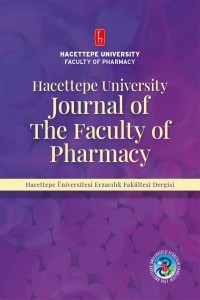Romatoid artrit tedavisinde metotreksat’ın reçetelenmesi ve izlemine yönelik gereksinimler ve hastanın kendi kendine bakım süreci ile ilgili konsensüs geliştirilmesi
metotreksat, romatoid artrit, Delphi tekniği, kendi-kendine bakım
Consensus Development on Requirements in Methotrexate Prescribing, Monitoring and Patient’s Self-Care in the Treatment of Rheumatoid Arthritis
methotrexate, rheumatoid arthritis, Delphi technique, self-care,
___
- Lee, D.M., Weinblatt, M.E. Rheumatoid arthritis, Lancet, 358,903-11 (2001).
- Gray, R., Muirie, J. Needs Assessment Report: Rheumatoid Arthritis in adults: Gain- ing health from effective treatment. Glasgow, Public Health Institute of Scotland, NHS Scotland (2002).
- Pincus, T., Yazici, Y., Sokka, T., Aletaha, D., Smolen, J.S.: Methotrexate as the “anchor drug” for the treatment of early rheumatoid arthritis, Clin. Exp. Rheumatol., 21(Suppl 31), 179-85 (2003).
- Salliot, C., van der Heijde, D.: Long-term safety of methotrexate monotherapy in pa- tients with rheumatoid arthritis: a systematic literature research, Annals of the Rheu- matic Diseases, 68(7), 1100-4 (2009).
- Borchers, A.T., Keen, C.L., Cheema, G.S., Gershwin, M.E. The use of methotrexate in rheumatoid arthritis, Seminars in Arthritis and Rheumatism, 34(1), 465-83 (2004).
- Grove, M.L., Hassell, A.B., Hay, E.M., Shadforth, M.F. Adverse reactions to disease- modifying anti-rheumatic drugs in clinical practice, QJM, 94, 309-19 (2001).
- Montag, K., Gingold, M., Boers, A., Littlejohn, G. Disease-modifying anti-rheumatic drug usage, prescribing patterns and disease activity in rheumatoid arthritis patients in community-based practice, Internal Medicine Journal, 41(6), 450-5 (2011).
- Wluka, A., Buchbinder, R., Mylvaganam, A., Hall, S., Harkness, A., Lewis, D., et al. Longterm methotrexate use in rheumatoid arthritis: 12 year followup of 460 patients treated in community practice, Journal of Rheumatology, 27,1864-71 (2000).
- Ortendahl, M., Schettler, J.D., Fries, J.F. Factors influencing length of time taking methotrexate in rheumatoid arthritis, Journal of Rheumatology, 27, 1139-47 (2000).
- Maetzel, A., Wong, A., Strand, V., Tugwell, P., Wells, G., Bombardier, C.: Meta-analysis of treatment termination rates among rheumatoid arthritis patients receiving disease- modifying anti-rheumatic drugs, Rheumatology, 39,975-81 (2000).
- Turner, G., Symmons, D., Bamji, A., Palferman, T.: Consultant rheumatology workforce in the UK: changing patterns of provision 1997-2001, Rheumatology, 41, 680-4 (2002).
- Roberts, C., Adebajo, A.O., Long, S. Improving the quality of care of musculoskeletal conditions in primary care, Rheumatology, 41, 503-8 (2002).
- Singh, J.A., Furst, D.E., Bharat, A., Curtis, J.R., Kavanaugh, A.F., Kremer, J.M., et al. 2012 update of the 2008 American College of Rheumatology recommendations for the use of disease-modifying antirheumatic drugs and biologic agents in the treatment of rheumatoid arthritis, Arthritis Care & Research, 64(5),625-39 (2012).
- Gaujoux-Viala, C., Smolen, J.S., Landewé, R., Dougados, M., Kvien, T.K., Martin-Mola, E., et al. Current evidence for the management of rheumatoid arthritis with synthetic disease-modifying antirheumatic drugs: a systematic literature review informing the EULAR recommendations for the management of rheumatoid arthritis, Annals of Rheu- matic Diseases, 69, 1004-9 (2010).
- Smolen, J.S., Landewe, R., Breedveld, F.C., Dougados, M., Emery, P., Gaujoux-Viala, C., et al. EULAR recommendations for the management of rheumatoid arthritis with synthetic and biological disease-modifying antirheumatic drugs. Annals of the Rheu- matic Diseases, 69(6), 964-75 (2010).
- British Society for Rheumatology, The Research Unit of The Royal College of Physicians. Guidelines and audit measures for the specialist supervision of patients with rheuma- toid arthritis, Journal of the Royal College of Physicians of London, 26(1), 76-81 (1992).
- American College of Rheumatology Ad Hoc Committee on clinical guidelines. Guide- lines for the management of rheumatoid arthritis, Arthritis & Rheumatism, 39(5), 713- 22 (1996).
- Scottish Intercollegiate Guidelines Network (SIGN). Management of early rheumatoid arthritis, Edinburgh: SIGN; 2011. (SIGN publication no. 123).
- British Society for Rheumatology. National guidelines for the monitoring of second line drugs. London: British Society for Rheumatology, July 2000.
- Visser, K., Katchamart, W., Loza, E., Martinez-Lopez, J.A., Salliot, C., Trudeau, J., et al. Multinational evidence-based recommendations for the use of methotrexate in rheu- matic disorders with a focus on rheumatoid arthritis: integrating systematic literature research and expert opinion of a broad international panel of rheumatologists in the 3E Initiative. Annals of the Rheumatic Diseases, 68(7), 1086-93 (2009).
- Pavy, S., Constantin, A., Pham, T., Gossec, L., Maillefert, J.F., Cantagrel, A., et al. Methotrexate therapy for rheumatoid arthritis: clinical practice guidelines based on published evidence and expert opinion, Joint Bone Spine : revue du rhumatisme, 73(4), 388-95 (2006).
- Katchamart, W., Bourre-Tessier, J., Donka, T., Drouin, J., Rohekar, G., Bykerk, V.P., et al. Canadian recommendations for use of methotrexate in patients with rheumatoid arthritis, J. Rheumatol, 37(7), 1422-30 (2010).
- Campbell, S.M., Cantrill, J.A. Consensus methods in prescribing research, Interna- tional Journal of Clinical Pharmacy and Therapeutics, 26, 5-14 (2001).
- Hasson, F., Keeney, S., McKenna, H. Research guidelines for the Delphi survey tech- nique, Journal of Advanced Nursing, 32(4), 1008-15 (2000).
- Fink, A., Kosecoff, J., Chassin, M.R., Brook, R.H. Consensus Methods: Characteristics and Guidelines for Use. Santa Monica, CA: RAND (1991).
- Thompson, A.E., Bashook, P.G. Rheumatologists’ recommended patient information when prescribing methotrexate for rheumatoid arthritis, Clin. Exp. Rheumatol, 28(4), 539-45 (2010).
- Jones, J., Hunter, D. Qualitative research: consensus methods for medical and health services research, BMJ, 311, 376-80 (1995).
- Greatorex, J., Dexter, T. An accessible analytical approach for investigating what hap- pens between the rounds of a Delphi study, Journal of Advanced Nursing, 32(4),1016- 24 (2000).
- Murphy, M., Black, N., Lamping, D., McKee, C., Sanderson, C., Askham, J., et al. Con- sensus development methods, and their use in clinical guideline development, Health Technology Assessment, 2(3), (1998).
- Yayın Aralığı: 2
- Başlangıç: 1981
- Yayıncı: Hacettepe Üniversitesi Eczacılık Fakültesi Dekanlığı
Birinci Basamak Tedavi Hizmetlerinde Baş Ağrılarına Yaklaşım: Eczacının Rolü
Aygin BAYRAKTAR-EKİNCİOĞLU, Kutay DEMİRKAN
Deepti JAİN, Pawan Kumar BASNİWAL
Paklitaksel yüklü nanopartiküllerin formülasyonu ve in vitro incelenmesi
Gözde AYGÜL, Fırat YERLİKAYA, Secil CABAN, İmran VURAL, Yılmaz ÇAPAN
L444P ve N370S mutasyonları taşıyan gaucher hastalarında makrootofaji-lizozomal sistem mals
İntestinal Absorpsiyonu Artırmak Amacıyla Kullanılan Permeasyon Artırıcı Ajanlar
Müge ATEŞ, Mustafa Sinan KAYNAK, Selma ŞAHİN
Ranunculus Türlerinin Kimyasal Bileşikleri ve Biyolojik Aktiviteleri
